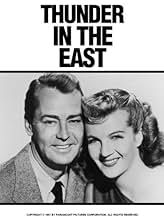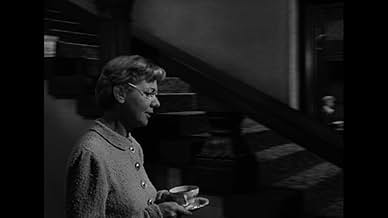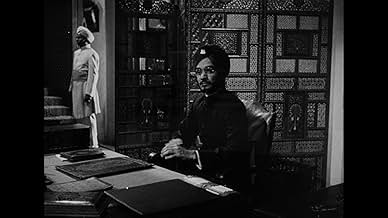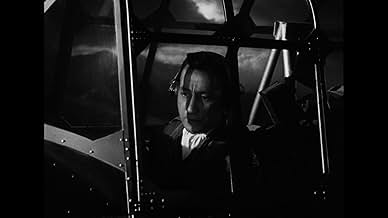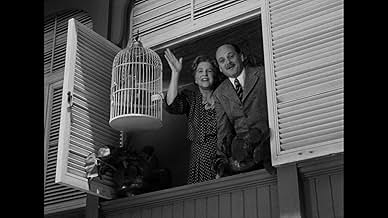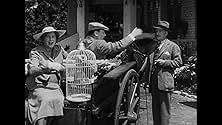NOTE IMDb
6,3/10
479
MA NOTE
Ajouter une intrigue dans votre langueIn a remote region of post-independence India, the love of a blind British woman pricks the conscience of an arms dealer.In a remote region of post-independence India, the love of a blind British woman pricks the conscience of an arms dealer.In a remote region of post-independence India, the love of a blind British woman pricks the conscience of an arms dealer.
- Réalisation
- Scénario
- Casting principal
Marc Cavell
- Moti Lal
- (as Mark Cavell)
Charles Lung
- Maharajah
- (as Charlie Lung)
Frank Baker
- Englishman
- (non crédité)
Mohinder Bedi
- Palace Servant
- (non crédité)
Orlando Beltran
- Bus Driver
- (non crédité)
Bobker Ben Ali
- Azam Habibbudin
- (non crédité)
Benita Booth
- Englishwoman
- (non crédité)
Margaret Brewster
- Mrs. Corbett
- (non crédité)
Avis à la une
Paramount must have had some trepidations about Thunder in the East as it was made in 1949 and held up in release for three years. Nat King Cole recorded the theme from Thunder in the East, a song called The Ruby and the Pearl three years earlier. It's quite a beautiful ballad and perfectly suited for Cole's voice, it's the best thing to come out of this routine action film.
Alan Ladd plays an arms dealer selling weaponry for the best price he can exact from the various sides in the Indian Civil War where the boundaries of India and Pakistan were settled in a lot of blood spilled. He's in Ghandahar province which has its rebel Moslem faction. He falls for Deborah Kerr the blind daughter of missionary Cecil Kellaway.
Ladd's got a silly playboy maharajah in Charles Lung to deal with and a prime minister for Ghandahar who is a disciple of Gandhi's non-violence philosophy. Charles Boyer as the prime minister doesn't want the weapons, but the rebel Moslems want them if for no other reason than to keep them out of Hindu hands and if they can't buy them, they'll take them by whatever means necessary.
The film tries to be a critique of Gandhi's non-violence code, but it doesn't rise above being an action/adventure story. The ending is a rather abrupt one and unconvincing. Still fans of the star players will probably like it.
Alan Ladd plays an arms dealer selling weaponry for the best price he can exact from the various sides in the Indian Civil War where the boundaries of India and Pakistan were settled in a lot of blood spilled. He's in Ghandahar province which has its rebel Moslem faction. He falls for Deborah Kerr the blind daughter of missionary Cecil Kellaway.
Ladd's got a silly playboy maharajah in Charles Lung to deal with and a prime minister for Ghandahar who is a disciple of Gandhi's non-violence philosophy. Charles Boyer as the prime minister doesn't want the weapons, but the rebel Moslems want them if for no other reason than to keep them out of Hindu hands and if they can't buy them, they'll take them by whatever means necessary.
The film tries to be a critique of Gandhi's non-violence code, but it doesn't rise above being an action/adventure story. The ending is a rather abrupt one and unconvincing. Still fans of the star players will probably like it.
And one of Alan Ladd's best.
"Thunder in the East" boasts excellent direction by Charles Vidor, the camerawork of one of Hollywood's master cinematographers, Lee Garmes (who worked on most of the Von Sternberg-Dietrich masterpieces), and memorable performances by Ladd, Deborah Kerr, Charles Boyer, Cecil Kellaway, John Williams, and virtually everyone involved. The romance between Ladd and Kerr is poignant and unforgettable ("The awning is still blue."), and Kerr is a standout as a blind woman who's afraid to leave the city that she was born in, and knows so well that she can walk through as if she had sight.
The film's political message won't appeal to pacifists, and while there is only one real action scene at the end, the offscreen acts of violence leading up to it are extremely disturbing: a bus load of refugees, many of them children rides off with the children happily singing a song. We later hear that the bus was attacked and that everyone on board had been killed. An English couple attempts to evacuate by driving off in a horse and carriage, only to have their empty carriage return, and one of the main characters has his hand cut off by the bad guys (the attacking Muslim forces) in an attempt to persuade him into complying with their demands.
The open ending, described as "abrupt" in some of the other reviews is a decade ahead of its time. I like to think the odds are in favor of our heroes -- however the main point is that each of the men advancing toward the camera (the primary and secondary protagonists) has undergone a profound change in character as a result of the events they've become embroiled in.
Yes, the film feels a little like "Casablanca" at times (is this a bad thing?); and, no, it isn't quite as great as "Casablanca" (few films are); but while it's not as enjoyable, it's much darker, more realistic (in spite of being set in a fictional state), has a deeper, more profound message, and a much more adult approach. "Casablanca" works so well because the overriding air of cynicism is merely a pose -- with the two most jaded characters (Rick and Louis) finding a cause to believe in. "Thunder in the East" offers little in the way of hope -- only violence (with superior force) can save one from violence. And even then, the outcome remains unknown.
I've only given this film 9 stars because it never rises to the level of a cinematic masterpiece (like "The Third Man," "The Lady from Shanghai," "Orphee," "Meshes of the Afternoon," "The Seventh Seal," or "Shane") -- but for a "standard" Hollywood film, I rank this with the "Greats."
"Thunder in the East" boasts excellent direction by Charles Vidor, the camerawork of one of Hollywood's master cinematographers, Lee Garmes (who worked on most of the Von Sternberg-Dietrich masterpieces), and memorable performances by Ladd, Deborah Kerr, Charles Boyer, Cecil Kellaway, John Williams, and virtually everyone involved. The romance between Ladd and Kerr is poignant and unforgettable ("The awning is still blue."), and Kerr is a standout as a blind woman who's afraid to leave the city that she was born in, and knows so well that she can walk through as if she had sight.
The film's political message won't appeal to pacifists, and while there is only one real action scene at the end, the offscreen acts of violence leading up to it are extremely disturbing: a bus load of refugees, many of them children rides off with the children happily singing a song. We later hear that the bus was attacked and that everyone on board had been killed. An English couple attempts to evacuate by driving off in a horse and carriage, only to have their empty carriage return, and one of the main characters has his hand cut off by the bad guys (the attacking Muslim forces) in an attempt to persuade him into complying with their demands.
The open ending, described as "abrupt" in some of the other reviews is a decade ahead of its time. I like to think the odds are in favor of our heroes -- however the main point is that each of the men advancing toward the camera (the primary and secondary protagonists) has undergone a profound change in character as a result of the events they've become embroiled in.
Yes, the film feels a little like "Casablanca" at times (is this a bad thing?); and, no, it isn't quite as great as "Casablanca" (few films are); but while it's not as enjoyable, it's much darker, more realistic (in spite of being set in a fictional state), has a deeper, more profound message, and a much more adult approach. "Casablanca" works so well because the overriding air of cynicism is merely a pose -- with the two most jaded characters (Rick and Louis) finding a cause to believe in. "Thunder in the East" offers little in the way of hope -- only violence (with superior force) can save one from violence. And even then, the outcome remains unknown.
I've only given this film 9 stars because it never rises to the level of a cinematic masterpiece (like "The Third Man," "The Lady from Shanghai," "Orphee," "Meshes of the Afternoon," "The Seventh Seal," or "Shane") -- but for a "standard" Hollywood film, I rank this with the "Greats."
I liked "Thunder in the East," a 1952 release for this film, made in 1949.
This film looks to have been made on a smallish budget and takes place in the first years of India's freedom from Britain. A man named Steve Gibbs (Alan Ladd) flies in a plane filled with armaments in the Ghandahar province in order to sell them. However, the Prime Minister, Singh (Charles Boyer) wants to achieve a peaceful resolution with the leader of the guerrillas, Khan.
The British living in India are delusional, not realizing that the guerrillas are about to attack. The ones who do get out end up dead en route. Gibbs meets Joan Willoughby (Deborah Kerr) and her parson father (Cecil Kellaway) and manages to meet the maharajah, who defers to the Prime Minister and then leaves the country for the winter.
Gibbs offers his plane, but he gouges the people wanting to leave, which angers Joan, who was falling for him. Now she turns against him and no one will give into what they call blackmail. They gather at the palace, waiting for the guerrillas to attack, and hope that the Prime Minister will let them use the guns he has.
There are a couple of problems with this film. One is the casting of Charles Boyer and his French accent and heavy makeup. I have to say, he was wonderful. He was an underrated actor, but miscast.
The script has a few clichés, particularly the hard core businessman falling for a sweet, altruistic woman. Nevertheless, it certainly held my interest.
I read some complaints about the ending, which for me was the best part of the film. Very dramatic and very exciting. As far as the Prime Minister's beliefs, he was a human being and acted on an injustice viscerally. His idealism went out the window, and that's okay. That's what happens sometimes.
Alan Ladd did a good job in a Bogart-type role. I never considered him much of an actor, but that monotone type of line reading works fine in this type of part, as it did in his film noirs. Deborah Kerr was lovely as a good woman who prides herself on her independence and fearful of losing it.
The film was probably trying to make the point that Gandhi was an idiot, and that following his principles wasn't a good idea. Not sure I'd conclude that in all cases. Maybe in this one.
This film looks to have been made on a smallish budget and takes place in the first years of India's freedom from Britain. A man named Steve Gibbs (Alan Ladd) flies in a plane filled with armaments in the Ghandahar province in order to sell them. However, the Prime Minister, Singh (Charles Boyer) wants to achieve a peaceful resolution with the leader of the guerrillas, Khan.
The British living in India are delusional, not realizing that the guerrillas are about to attack. The ones who do get out end up dead en route. Gibbs meets Joan Willoughby (Deborah Kerr) and her parson father (Cecil Kellaway) and manages to meet the maharajah, who defers to the Prime Minister and then leaves the country for the winter.
Gibbs offers his plane, but he gouges the people wanting to leave, which angers Joan, who was falling for him. Now she turns against him and no one will give into what they call blackmail. They gather at the palace, waiting for the guerrillas to attack, and hope that the Prime Minister will let them use the guns he has.
There are a couple of problems with this film. One is the casting of Charles Boyer and his French accent and heavy makeup. I have to say, he was wonderful. He was an underrated actor, but miscast.
The script has a few clichés, particularly the hard core businessman falling for a sweet, altruistic woman. Nevertheless, it certainly held my interest.
I read some complaints about the ending, which for me was the best part of the film. Very dramatic and very exciting. As far as the Prime Minister's beliefs, he was a human being and acted on an injustice viscerally. His idealism went out the window, and that's okay. That's what happens sometimes.
Alan Ladd did a good job in a Bogart-type role. I never considered him much of an actor, but that monotone type of line reading works fine in this type of part, as it did in his film noirs. Deborah Kerr was lovely as a good woman who prides herself on her independence and fearful of losing it.
The film was probably trying to make the point that Gandhi was an idiot, and that following his principles wasn't a good idea. Not sure I'd conclude that in all cases. Maybe in this one.
This film would have been more believable had it been set in Arizona or a similar location, where the "Foreign Leigion" is the US Cavalry, with Anthony Quinn the sergeant , the naughty natives were the Apaches ... and somehow a contrived "Lost City" was stumbled upon somewhere west of Tuscon !!
But "clean" , dry-skinned French cavalry stumbling over a "lost" city in Algeria (with Indian dances and a Maharaja !) and scantily-clad , beautifully-groomed liberal ladies must have raised a few eyebrows even in 1953 !
Still , I hope someone (s) made a small living out of this wasted effort in time and money.
But "clean" , dry-skinned French cavalry stumbling over a "lost" city in Algeria (with Indian dances and a Maharaja !) and scantily-clad , beautifully-groomed liberal ladies must have raised a few eyebrows even in 1953 !
Still , I hope someone (s) made a small living out of this wasted effort in time and money.
Simply a daft film... a very silly film. Ludicrous casting and script though the historical setting and subject matter has real possibilities. The ending was so ridiculously predictable. Alan Ladd playing a sort of B movie gun runner, Charles Boyer playing an Indian... the interest in this film being just how amusingly silly it was.
Le saviez-vous
- AnecdotesFilm debut of Jill St. John.
- ConnexionsReferenced in O Espectador que o Cinema Esqueceu (1991)
Meilleurs choix
Connectez-vous pour évaluer et suivre la liste de favoris afin de recevoir des recommandations personnalisées
- How long is Thunder in the East?Alimenté par Alexa
Détails
- Date de sortie
- Pays d’origine
- Langues
- Aussi connu sous le nom de
- Thunder in the East
- Lieux de tournage
- Société de production
- Voir plus de crédits d'entreprise sur IMDbPro
Box-office
- Montant brut aux États-Unis et au Canada
- 2 000 000 $US
- Durée1 heure 37 minutes
- Couleur
- Rapport de forme
- 1.37 : 1
Contribuer à cette page
Suggérer une modification ou ajouter du contenu manquant

Lacune principale
By what name was Tonnerre sur le temple (1952) officially released in India in English?
Répondre
